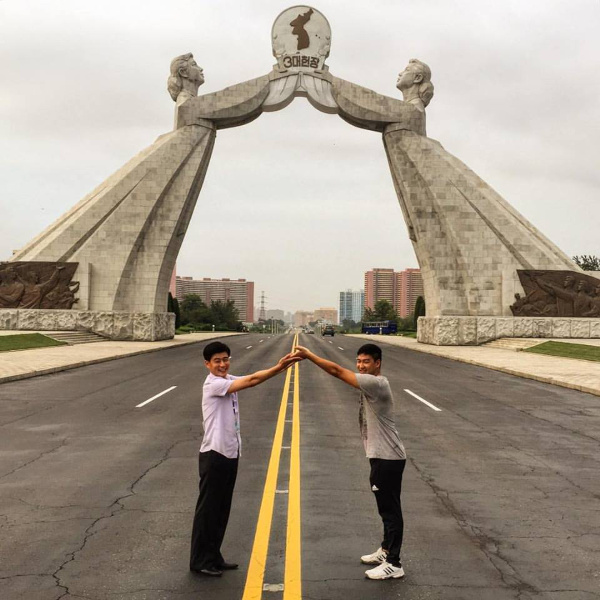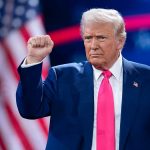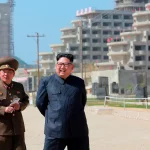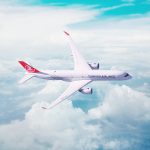One of the most surprising things travellers find on their first trip to North Korea, and a fact largely ignored in the Western media, is the people of the DPRK’s absolutely genuine desire for reunification with their southern counterparts – outwardly referred to as their “brothers and sisters.”
Most people’s introduction to the Korean’s fervent desire for reunification takes place on the outskirts of Pyongyang at the “Monument to the Three Charters of National Reunification.” This is a massive monument erected in 2001 at the entrance to the Tongil Highway (Reunification Highway), a wide, four-lane road connecting Pyongyang to Seoul, only a mere 195 kilometres away, and running straight to the DMZ.

Pictured: A DPRK citizen and Korean-Australian at the “Monument to Three Charters of National Reunification.”
The “Monument to the Three Charters of National Reunification” depicts two Korean women embracing in an arched formation, holding a map of a reunified Korea. Koreans will positively explain the idea that “…once reunification takes place, the first cars to drive from Seoul to Pyongyang will drive under this monument in a welcoming sign of peace.” Additionally, Korean guides will optimistically explain that both women depicted in the monument are identical due to the fact that “…we as Koreans are the same people.”
So, what are the “Three Charters to National Reunification?” In layman’s terms, the three charters put forward by President Kim Il Sung include reunification being achieved “peacefully, without outside interference and as the one true desire of all Korean people.”
The most commonly asked question by travellers is usually, “what system would a reunified Korea have?” Korean guides explain the proposal for the founding of the “Democratic Federal Republic of Koryo” and are very upfront in explaining their vision for a two-party system, running on two different ideologies, with two different systems in place. “We understand the South has an established system of capitalism they do not want to give up, just as we in the North have a system based on the ideology of Juche (the DPRK’s unique brand of socialism, or “self-reliance”) that we do not wish to give up.”
The ardent desire for reunification amongst all Koreans in the DPRK runs true to this sentiment. It is not uncommon to see even the most hardened of Korean guides have a moment of reflection when visiting the DMZ – the scar running through the Korean peninsula that has separated these estranged “brothers and sisters” since 1953.
In times of relative peace and stability on the Korean peninsula, discussions surrounding the reductions of geopolitical tensions between the North and South are more often than not refuted with responses from Korean guides such as “…while politics may be calming at this point, which you see as a positive thing, the strongest desire for us Koreans is not stability but reunification.”
With the upcoming summit between Prime Minister Moon Jae-in and Supreme Leader Kim Jong Un historically signaling the first time two leaders of North and South have been in the same room, not to mention talks of officially ending the war set to take place, will Pyongyang’s citizens see those cars rolling up from Seoul sooner than they thought?






